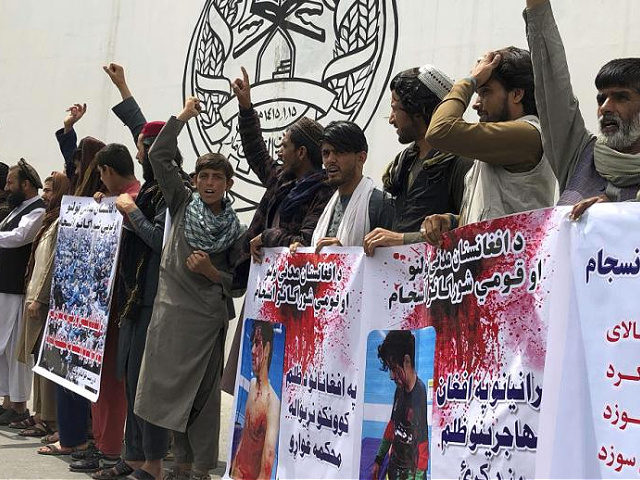Iran’s Foreign Ministry on Tuesday summoned Afghanistan’s charge d’affaires in Tehran to protest against violent attacks by Afghans on the Iranian Embassy in Kabul and the Iranian Consulate General in Herat on Monday, the official website of the Iranian Foreign Ministry reported.
“The Iranian Foreign Ministry’s director general for South Asia summoned the Afghan charge d’Affaires in Tehran on Tuesday to strongly protest against the attacks,” the Ministry of Foreign Affairs of the Islamic Republic of Iran confirmed on April 12.
“He reminded the Afghan charge d’Affaires of the responsibility of governments in ensuring the security of diplomatic missions, and called for legal action against those who attacked the Islamic Republic of Iran’s missions,” according to the report.
Tehran shut down its Afghan diplomatic missions on Tuesday after they were targeted during violent anti-Iran protests across Afghanistan one day earlier. The sites will remain closed until Tehran receives assurances from Kabul that it will support secure operations at Iranian diplomatic missions, according to the April 12 press release.
The mob violence against Iran’s diplomatic missions in Afghanistan included, according to Agence France-Presse (AFP) on Tuesday:
On Monday [April 11], dozens of Afghans chanting “Death to Iran” demonstrated outside the Iranian consulate in Herat. […]
Demonstrators burned an Iranian flag and damaged surveillance cameras at the mission before dispersing, an AFP correspondent said. They also threw stones at the compound.
On Monday, a similar anti-Iran protest occurred in the southeastern city of Khost, and another took place outside the Iranian embassy in Kabul.
Alleged social media videos purportedly showing Iranian border guards and civilians assaulting Afghan refugees caused the riots outside Iran’s diplomatic missions in Kabul and Herat on April 11, AFP reported. The news agency said the videos in question began circulating on social media between April 8 and April 10. The footage “claim[ed] to show Iranian border guards and Iranian mobs beating Afghan refugees in Iran.”
“One video seemed to show Iranian border guards beating Afghan refugees; another appeared to show a group of Iranians dragging and beating refugees in some sort of compound,” the U.S. government-funded Radio Free Europe/Radio Liberty (RFE/RL) detailed on Tuesday.
“It was unclear when the images were filmed, and their authenticity could not be independently verified,” AFP acknowledged on April 12.
The Iranian Embassy in Kabul dismissed the videos in question as “baseless and invalid” on April 10.
Iranian Foreign Ministry spokesman Saeed Khatibzadeh warned on Sunday against an alleged plot by “certain ill-wishers of Iran and Afghanistan” designed to “draw a wedge between people of the other country,” as quoted by AFP.
Iranian Interior Minister Vahid Amiri seconded this take on April 12, telling reporters “certain currents and circles seek[ing] to provoke division between Iran and Afghanistan” were behind the videos, adding, “the conspiracy has been planned by both nations’ enemies.”
Iranian Ambassador to Kabul Bahadur Aminian gave an interview to Afghanistan’s Tolo News on April 10 in which he elaborated on this alleged scheme by unnamed actors to “poison” diplomatic relations between Iran and Afghanistan.
“[T]he videos — which show Afghan refugees being harassed — are made by some circles who seek to make plots to undermine the relations between Kabul and Tehran,” Aminian told Tolo News.
“We have a group called the People’s Mujahideen Organization of Iran, which has appointed thousands of people just to release clips [online] … they are active in Afghanistan and Iran as well and everywhere,” the ambassador claimed.
“They are from the previous government but are cooperating with the caretaker government [Taliban] as well,” he said of the organization.
Aminian referred to the People’s Mujahedin Organization of Iran (PMOI). The group, the largest dissident organization active in the country, is alternatively known as Mujahedin-e-Khalq (MEK) or Mujahedin-e-Khalq Organization (MKO).
The Taliban, a hardline Sunni Muslim organization, overtook Kabul on August 15, 2021, after now-former President Ashraf Ghani fled the country. The group previously ruled Afghanistan from 1996 to 2001 until the U.S. launched a nearly 20-year-long war in Afghanistan and ousted the Taliban from Kabul in late 2001. The political turmoil spurred thousands of Afghans to flee Kabul and the rest of Afghanistan, with many leaving for neighboring Iran in recent months. Iran and Afghanistan share a nearly 1,000-mile land border.

COMMENTS
Please let us know if you're having issues with commenting.